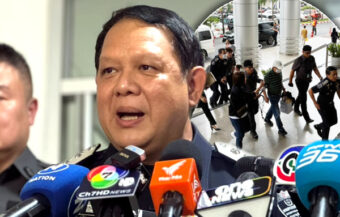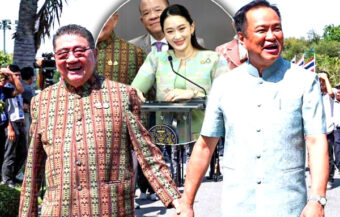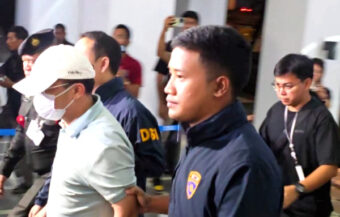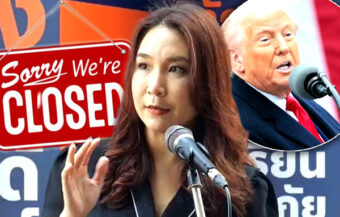Thailand’s new senate is due to also be confirmed shortly as its 250 handpicked members get ready to play a new, more powerful role under the new constitution. Although there are still some possibilities and permutations, it looks like at the end, it will be a continuation of the present regime even if it means a short term, unstable opposition government. Even that prospect is beginning to appear to look quite unlikely at the dawn of a new political age in Thailand.
As Thailand’s March 24th election results are confirmed, the new Thai senate also comes into a being. A week after hugely successful celebrations for the coronation of the Thai king, a new political environment prepares to open up. Initially however, the focus may be on efforts by the former ruling Pheu Thai Party to form a seven party coalition in the new parliament, when it meets, to elect a new government. However, this week’s confirmed results follows a decision of the Constitutional Court on the method used in the calculation of the party list seats. This makes the prospect of an opposition coalition government even more difficult. With over 40 probes underway by the election commission which could see newly elected MPs disqualified as well as probes into the Future Forward Party leaders and the party itself, the prospect of an opposition led government looks very uncertain. Add to this, the prospect of criminal proceedings against the Future Forward Party leader and others, and the hill towards a viable and stable government led by the opposition parties, begins to look very steep indeed. The prospect of a continuation the premiership of Prayut Chan ocha looks like a high one after all the constitutional, electoral, legal and political moves are played out.
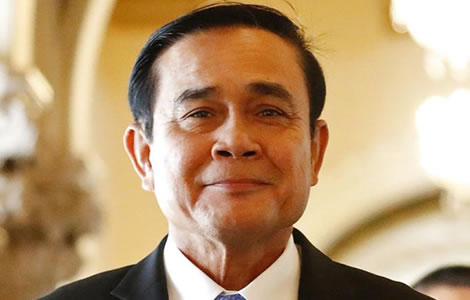
Thailand’s election commission is on course to confirm the results of the March 24th general election after the Constitutional Court today ruled that Section 128 of the electoral law was constitutional, a decision that is in conformity with the approach the election commission had previously indicated it was taking in finalising the selection of 150 party list MPs under Thailand’s electoral laws governing the poll.
Grey area between the constitutional provision and the 2018 electoral law argued over
The conflict over the allocation of party list seats boiled down to an apparent conflict or grey area between Section 91 of the 2017 constitution and Section 128 of the electoral law approved to hold the election. The issue surrounds how the votes should be counted in determining the outcome.
Pheu Thai and Future Forward parties: political parties who did not attain a quota or 71,000 votes excluded from party list seats
The Pheu Thai Party and the the Future Forward Party had contended that a party must first achieve a quota of votes, set at 71,000, to be represented at all in the national parliament. They had argued that any further votes under the party list system should only be apportioned between those parties who have achieved this status. However, the election commission, citing Section 128 of the electoral law, had adapted an interpretation that every vote must count. This has now been endorsed by Thailand’s Constitutional Court.
Now up to 27 parties to gain party list seats – result a loss to Pheu Thai and Future Forward
In effect, it means that some Thai parties who only received 45,000 votes will now find themselves with a seat in the new national parliament. One of these parties for instance, is the Thairaktham Party, a party that campaigned on longer opening hours for adult entertainment and go go bar venues as well as the legalisation of sex toys. The decision by the court is a blow to the efforts of Pheu Thai and the Future Forward Party to form a government when the new parliament meets by putting together over 250 votes in the new body to elect a new Prime Minister without the intervention of the 250 member upper house or senate as provided for in Section 270 of the 2017 constitution.
Boost to prospects of new premiership for Prayut
The Constitutional Court decision today is seen as a positive outcome for the Palang Pracharat Party and the junta to form a new government centered on current premiership of Prayut Chan ocha. However, events must be allowed to play out according constitutional arrangements and the new politics which will now come into play.
May 9th deadline honored by election commission
Within the election commission, it is suggested that this will leave 27 parties sharing in the 150 party list seats. The announcement of the party list MPs is imminent to meet the May 9th deadline set under the constitution for concluding the election held on March 24th. Pheu Thai and the Future Forward Party had argued that only 16 parties should have divided these seats.
Opposition parties had issued warnings to the election commission about party list count
Before the decision of the constitutional court today on the matter which was unanimous, both Pheu Thai and the Future Forward Party had warned the election commission of possible legal action or consequences if the party list seats were calculated as it proposed to do. Laddawan Wongsriwong of Pheu Thai submitted a representation in writing to the body supporting the interpretation of the party based on Section 91 of the constitution demanding that smaller parties who had not reached a quota, be excluded. The written submission claimed that the preferred method of the election oversight body was unconstitutional. This position has now been somewhat undermined by the unanimous Constitutional Court decision
Founder of Future Forward and law professor questioned commission’s approach
The election commission also received a submission from the co founder and secretary general of the Future Forward Party who again put forward the same interpretation that parties who did not reach 71,000 votes be excluded. Piyabutr Saengkanokkul is professor at law at Thammasat University. He also claimed that the commission’s interpretation was unconstitutional. He threatened to take legal action against the body for negligence if it persisted on its current course. This has now, however, been endorsed by the Constitutional Court which strengthens the commission hand in the matter. The effect of the decision for Future Forward could see that party lose seven seats. As things stand, the Pheu Thai party will have no party list MPs at all.
Efforts by Pheu Thai to build 7 party coalition to elect a new Thai Prime Minister
The final tally of constituency and party list seats is expected to leave the Pheu Thai Party with 136 seats. One seat in Chiang Mai, where Pheu Thai topped the poll, is already the subject of a rerun scheduled for the end of this month. The Future Forward Party are estimated to achieve 80 seats giving any coalition at least 216 seats. The two parties have been working on forming a coalition of 7 parties including the two larger political groups and five smaller parties including the Liberal Party, the New Economics Party, Prachachart, Pueachat and the People’s Power Party. This grouping or coalition, if it can be held together, could theoretically elect a new anti junta government in parliament by a slim majority or perhaps with the support of others.
Parties and MPs facing probes and possibly criminal prosecutions which hang over election result
However, the plan faces problems. These include the fact that up to 40 seats are being investigated by the election commission who today specifically reserved the right to disqualify the MPs newly confirmed. There is also a question mark over Thanathorn Juangroongruangkit, the young leader of the the Future Forward Party and others in the party who are also facing probes both by the election commission and Thai police or prosecution authorities. There are also doubts about the ability of the 7 party group to adhere to the pact of cooperation to form a government.
Section 270 would see the new Thai senate enter the arena to elect a new PM under charter
Meanwhile, if there is an inability by the new parliament, when it meets, through its 500 member body’s failure to agree on a vote for Prime Minister, the option is then open to invoking Section 270 which would bring the 250 member Senate, handpicked by the military junta, to assist in breaking the deadlock. Should this occur, then the current prime Minister will undoubtedly be elected Prime Minister.
Any Pheu Thai, Future Forward party government would be very short lived even if implausible
It could conceivably happen that an anti junta coalition manages to to pull together over 250 votes and elect a prime minister provided no further seats are lost as a result of the ongoing election commission and criminal probes should they prove to be inconclusive. This would leave a new anti junta government still facing the powerful senate which has an an oversight role. However, the peril still facing any such government continues to be a loss of its majority though the future disqualification of sitting MPs or even one of the parties altogether. The failure of such a government through a vote of no confidence would then be certain. This would see a new pro junta government come the power again through the intervention of the senate.
Thailand’s new senate moving into position this week as election results are confirmed
Meanwhile, as the commission is confirming the 500 seat parliament, Thailand’s monarchy on Friday is also expected to give his seal of approval to the 250 seat senate list which is being presented for approval. During the course of the last few weeks, this has seen cabinet ministers resigning as they are expected to be named to the powerful upper house of Thai senate. It is reported that up to 60 members of Thailand’s National Legislative Assembly, the junta appointed legislature which will be replaced by the new parliament, have been included in the list. These include that body’s President, Pornpetch Vichitcholchai and vice presidents Surachai Liangboonlertchai and Peerasak Phochit.
Cabinet ministers resign to join the new senate
The movement to the new senate and other resignations due to the election has been Thailand’s current cabinet reduced from 36 to 17 members. Resignations this week included Justice Minister Prajin Juntong, Natural Resources and Environment Minister Surasak Kanjanarat as well as Education Minister Teerakiat Chaorensretsilp and Labor Minister Adul Sangsingkeo. Deputy Prime Minister Chatchai Sarikulya has also moved on to be included in the new Senate. However, it reported that Prawit Wongsuwan, the well known Defense Minister and Deputy Prime Minister, will remain working with the cabinet and the government.
Thai Prime Minister gives assurances that government will function normally
The Thai Prime Minister Prayut Chan ocha, whose brother and former Legislative Assembly member Preecha Chan ocha is to be a new senate member, this week assured the Thai public that the slimmed down government will function well with the assistance of the civil service in running the country. The selection of the 250 seat senate has been an ongoing process under a highly secret but high powered junta committee. The body will have a powerful role of play not only the possible selection a new Prime Minister but in a new oversight role ensuring that any new government adheres to the junta’s 20 year national plan.
PM: role of the role of the new Thai senate show be viewed positively by the public
One of the vice presidents of the National Assembly who is tipped to be senator explained the role this week to The Nation newspaper: ‘The Senate will vote to endorse a prime minister, but the MPs have the right to form a majority first,’ he said. The new Senate will be announced through the Royal Gazette very shortly.
The prime minister has been striking a theme of continuity and encouraging patience with the new political environment. This week, he said that Thai people should view the new senate positively and that its role was to ensure that the achievements and good work of the last 5 years are built upon.



